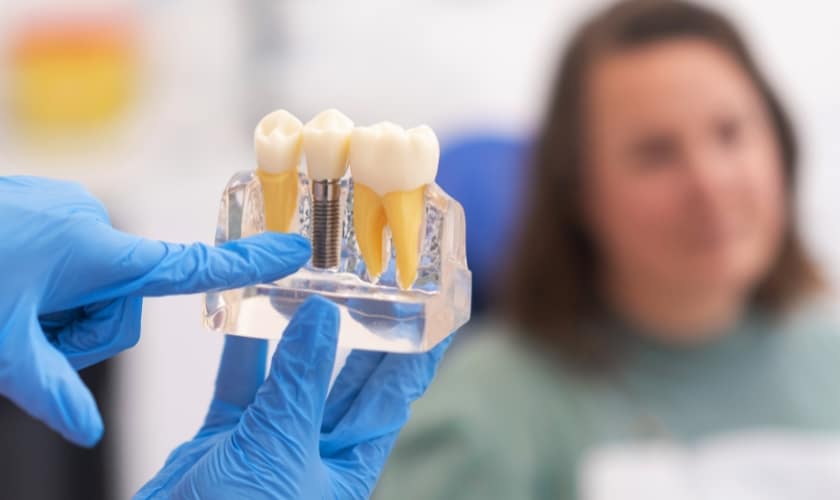
Tooth loss can be a challenging experience, impacting not only your smile but also your ability to eat and speak comfortably. Fortunately, advancements in dental technology have introduced a long-lasting and effective solution: dental implants. However, with various tooth replacement options available, deciding if dental implants are the right choice for you can be overwhelming. This guide explores everything you need to know about dental implants, including their benefits, the procedure involved, and the cost comparison to other options like dentures. Let’s delve into the question: Is it worth getting dental implants?
Introduction to Dental Implants
Dental implants are artificial tooth roots made of biocompatible titanium screws surgically placed into your jawbone. These implants act as anchors for crowns, bridges, or dentures, mimicking the function and appearance of natural teeth. Unlike traditional dentures that rest on top of the gums, implants become integrated with the jawbone through a process called osseointegration, providing a stable and secure foundation for your replacement teeth.
What are Dental Implants?
Dental implants typically consist of three main parts:
- The implant: A screw-like post made of titanium, a biocompatible material that fuses with the jawbone.
- The abutment: A connector piece attached to the implant that emerges above the gum line.
- The restoration: This is the visible part, such as a crown, bridge, or denture, customized to match the size, shape, and color of your natural teeth.
Benefits of Dental Implants
Compared to other tooth replacement options, dental implants offer several advantages:
- Enhanced appearance: Implants provide a natural-looking and aesthetically pleasing solution, restoring your smile’s confidence and functionality.
- Improved speech: Traditional dentures can sometimes slip, affecting speech clarity. Implants function and feel like natural teeth, eliminating speech impediments.
- Increased chewing ability: Implants allow you to chew and eat a wider variety of foods with greater ease and confidence compared to dentures.
- Long-term durability: With proper care, implants can last a lifetime, unlike dentures that require replacement every 5–10 years.
- Preserves jawbone health: Implants stimulate the jawbone, preventing bone loss that can occur with missing teeth and traditional dentures.
- Improved self-esteem: Replacing missing teeth with natural-looking implants can positively impact your self-confidence and overall well-being.
The Process of Getting Dental Implants
The process of getting dental implants typically involves several steps spread over several months, depending on individual healing times and bone density:
1. Consultation and Treatment Plan: During an initial consultation with a qualified dentist like the ones at Pacific Northwest Dental-Dentist Beaverton, your oral health and jawbone structure will be thoroughly evaluated to determine if you’re a suitable candidate for implants.
2. Implant Placement: After creating a treatment plan, the dentist surgically places the titanium implant(s) into your jawbone under local anesthesia or mild sedation. The area will then be stitched closed to allow for healing, which can take several months.
3. Abutment Placement: Once the implant site has healed, a second appointment is scheduled to place the abutment, the connector piece that attaches to the implant and emerges above the gum line.
4. Restoration Attachment: After another healing period, the final restoration, such as a crown, bridge, or denture, is securely attached to the abutment, completing the implant process.
Is It Worth Getting Dental Implants?
The decision to invest in dental implants is a highly personal one, influenced by various factors such as oral health, lifestyle, and budget. However, research indicates that dental implants offer significant long-term benefits:
- Dental implants boast an impressive success rate of over 95%.
- Dental implants contribute to improved oral health and overall well-being, leading to greater patient satisfaction.
Cost Comparison: Dentures vs. Dental Implants:
- Dentures: They may need adjustments or replacements every 5–10 years due to wear and tear and changes in the jawbone. Additionally, denture adhesives are often required for a secure fit, adding to the ongoing cost.
- Dental Implants: While the average cost of a single implant with a crown can range from $3,000 to $5,000, they are considered a long-term investment with a lifespan of 20 years or even a lifetime with proper care. Additionally, they do not require replacements as frequently as dentures and eliminate the need for adhesives.
Beyond the initial cost, it’s important to consider the potential impact on your overall health and well-being:
- Dentures can contribute to jawbone loss due to a lack of stimulation, potentially leading to facial collapse and further health complications.
- Dental implants stimulate the jawbone, preventing bone loss and maintaining facial structure.
Pros and Cons of Dental Implants
Pros:
- Natural-looking and aesthetically pleasing
- Improved chewing ability and speech clarity
- Long-lasting and durable
- Preserves jawbone health
- Increased self-confidence and overall well-being
Cons:
- Higher upfront cost compared to some other options
- Surgical procedure required, which may not be suitable for everyone
- Longer treatment time compared to dentures
- Requires proper care and maintenance
Dental Implants: Alternative Options
While dental implants are an excellent solution for many, they may not be suitable for everyone due to various factors. It’s important to explore other available options and discuss them with your dentist at Pacific Northwest Dental – Dentist Beaverton:
- Dentures: While not as long-lasting or natural-looking as implants, they offer a more affordable option for replacing multiple teeth.
- Bridges: can be used to replace missing teeth anchored by healthy teeth on either side of the gap.
- Partial dentures: Removable partial dentures are a good option for replacing a few missing teeth scattered throughout the mouth.
Conclusion
Dental implants offer a life-changing solution for individuals seeking a permanent, functional, and aesthetically pleasing way to replace missing teeth. While the initial cost may be higher than some alternatives, their long-term durability, positive impact on oral health, and improved quality of life make them a valuable investment for many people.
If you’re considering dental implants, schedule a consultation with a qualified dentist like the ones at Pacific Northwest Dental – Dentist Beaverton to discuss your individual needs and determine if this option is the right choice for you.
FAQs
1. How long does the dental implant process take?
The entire process can take several months, depending on individual healing times and bone density. The initial consultation and treatment plan development take place in one appointment, followed by implant placement and healing (several months), abutment placement (another appointment and healing), and finally, the attachment of the final restoration.
2. Does getting dental implants hurt?
The implant placement procedure is typically performed under local anesthesia or mild sedation, minimizing discomfort. You may experience some soreness or swelling after the surgery, which can be managed with medication.
3. How do I care for dental implants?
With proper care, such as regular brushing, flossing, and professional dental cleanings, dental implants can last a lifetime. They are much more durable than traditional dentures, which typically need replacement every 5–10 years.
4. Are dental implants covered by insurance?
Dental insurance coverage for dental implants varies widely. It’s recommended to contact your insurance provider to understand your specific coverage and out-of-pocket costs. Pacific Northwest Dental – Dentist Beaverton can also assist you in understanding your insurance coverage and exploring financing options if needed.
5. What are the potential risks associated with dental implants?
As with any surgical procedure, there are some potential risks associated with dental implants, such as infection, bleeding, and nerve damage. However, these risks are uncommon when the procedure is performed by a qualified and experienced dentist.
